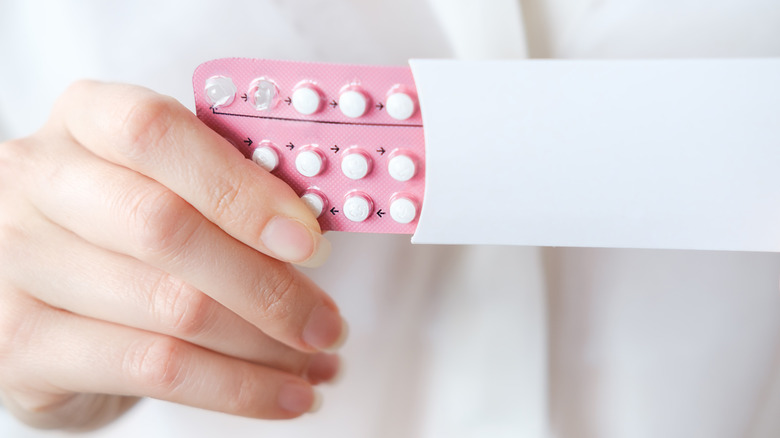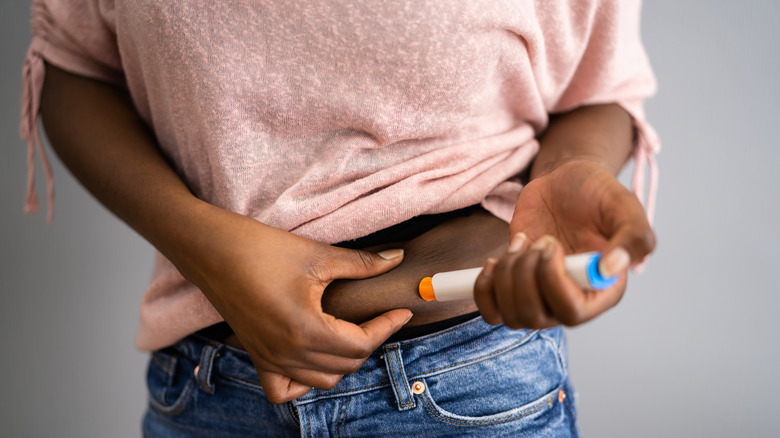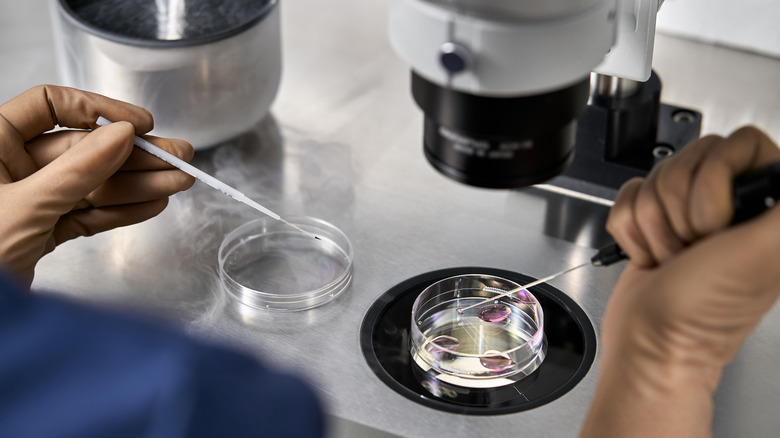How To Prepare If You Want To Freeze Your Eggs
You may have preconceived notions about freezing eggs – that it's something that only single people do, that it's an uncommon situation, or that it can be dangerous. But the truth is that egg freezing – also known as "mature oocyte cryopreservation" according to Mayo Clinic – is a safe, increasingly popular option for all different types of people who interested in having children. According to Dr. Sharon Jaffe, a reproductive endocrinologist at the Center for Reproductive Medicine in Winter Park, Florida (via Insider), "We have all types of patients coming in. We have patients who have not found a partner, we have couples who are married and want to delay childbirth until their 40s."
While "freezing eggs" may sound a bit sci-fi to those who don't know much about the procedure, it's known to be a safe method of preserving eggs for future fertilization and can be a great option for those who know they want kids — just not quite yet. From the financial components to potential risks to all the details of the process, we've compiled all the information you need to know if you want to freeze your eggs.
Take some time to think about the decision
Freezing your eggs may be right for you, especially under certain circumstances. For example, conditions like sickle cell anemia and autoimmune diseases like lupus can affect your fertility (per Mayo Clinic), so freezing your eggs may allow you to have biological children despite fertility issues. Additionally, people who are undergoing radiation or chemotherapy may experience damage to their fertility, and freezing eggs before undergoing these treatments can act as a protective measure to give people the option to eventually have biological kids.
Freezing your eggs may also be a good choice if you know you one day want biological children but don't want them until later in life. However, the process of freezing eggs is not for everyone; for some, opting for adoption or a surrogate can be a better option. To get clear on whether or not freezing your eggs is a good option for you, NPR recommends making a pros and cons list, asking yourself questions like "How important is it for me to have a biological connection to my children?" and "What is my goal for freezing my eggs?"
Like any other big decision, taking some time to get clear on what you want is a good first step when considering freezing your eggs.
Consider your age
You've probably heard from different sources that past age 35, pregnancy becomes increasingly difficult and risky. And while "It is absolutely true that fertility starts to decline in your 30s," according to Dr. Amanda Adeleye, an assistant professor and reproductive endocrinologist at the University of Chicago (per NPR), it's also very possible to have a healthy pregnancy in your late thirties and beyond.
The fact that occurrences of pregnancy in people over 35 are referred to as "geriatric" or "elderly" pregnancies (via Slate) does seem to cement the idea that getting pregnant in your late thirties is a whole different ballgame than getting pregnant at a younger age. But is that actually true? According to OB-GYN W. Spencer McClelland, age 35 was made a cut-off point from decades-old research, and though certain risk factors do tend to come into play at that age, the bottom line is the age at which someone can have a healthy pregnancy varies drastically from person to person. According to McClelland: "While it is true that there exists a relative decline in fertility over time, the truth is that, in absolute terms, women 35 and over are still very likely to conceive without difficulty, and at about the same rate as women under 35."
In other words, if you're in your early thirties — or younger — you don't need to rush into egg freezing, unless you have fertility issues or other medical issues that may impact your ability to become pregnant.
Lean on your support system
Research shows that the people who most frequently opt to freeze their eggs are white women (per The New York Times). Despite this, egg freezing is available to anyone, regardless of race or gender. For example, transgender people may want to freeze eggs before starting testosterone therapy or undergoing surgery, giving them the option to have a biological child eventually. And, of course, people of all races can and do freeze their eggs — not just white women. Atlanta obstetrician-gynecologist Dr. Desireé McCarthy-Keith weighed in on the issue, stating: "Historically, fertility treatments have been mostly targeted to and used by white women, middle-class women, so the initial presentation of fertility treatments, they didn't really include us [black women] in the conversation," she said.
Though things are slowly changing, one barrier to getting started on the egg-freezing process is experiencing a lack of support – either from fertility centers and doctors or from society at large. "Marginalized communities, like people of color and trans people, may not seek fertility treatments because the option might not be presented to them by family or doctors," Angela Bethea-Walsh, a licensed psychologist with a specialization in fertility psychotherapy, said (via NPR). One way to combat the stigma is to really lean on your support system — whether that's a family member, friends, or a supportive partner — who can help you find a supportive team and fertility center to work with when it comes to egg freezing.
Consider the financial component
According to the New York Times, around "20% of U.S. companies with more than 20,000 employees" cover egg freezing for employees, with many prominent tech companies like Facebook, Google, and Apple among these companies (per Very Well Family).
However, if you work for a company that is part of the 80% who don't cover egg freezing, you may be wondering how much you'll have the pay for the procedure. Unfortunately, it's not cheap: according to board-certified fertility specialist Dr. Shahin Ghadir (per Investopedia), "Generally, egg freezing in the U.S. varies from $7,000 to $10,000. These prices do not include medication, which is generally chosen per the specific protocol needed for the individual." The total cost for one cycle of egg freezing can cost $15,000 to $20,000, with prices rising depending on your location (per Investopedia). Freezing eggs in an expensive city like New York City will likely translate to a higher total cost, whereas egg freezing in a city like Boston would likely be cheaper, according to Investopedia.
Additionally, those who are interested in doing multiple cycles of egg freezing (in attempts to ensure a viable egg is frozen) can expect to pay more than those who do only one round, per Investopedia. A breakdown of the average cost of the procedure is offered by FertilityIQ (via Investopedia) and is as follows: "$11,000 for treatment (includes monitoring, egg retrieval, anesthesia); $5,000 for medication (this will vary depending on the patient); $2,000 for storage (presumably five years)."
You may have to take birth control
Depending on the fertility center you choose to work with, you may be put on birth control prior to starting fertility medication. Though some may think taking a birth control pill would be a counterintuitive move — the goal is to harvest eggs, after all — birth control can, for some people, regulate the menstrual cycle and up the odds of follicles growing at a consistent size and rate (per The New York Times).
If birth control is not for you, don't worry: not all fertility centers will require you to take birth control. In fact, Extend Fertility recommends stopping birth control two to three months prior to beginning the egg freezing process, since some studies show that taking birth control before freezing eggs can lead to the body having a less effective response to egg freezing medications. This can lead to patients needing to take more medication, and can also result in fewer eggs retrieved.
You will have to do daily injections
If you're wary of needles or shots, you may have to mentally prepare a bit before deciding to freeze your eggs. This is because one of the first steps of the egg freezing process is injecting yourself with ovary-stimulating hormones called gonadotropins (via Forbes).
The injections, which happen daily for ten to twelve days, stimulate the ovaries to produce several eggs at the same time — a phenomenon known as superovulation. Rather than producing one egg each month, as is the usual case, the injections allow patients to produce "ten to twenty" eggs in just one cycle, according to reproductive endocrinologist and professor, Dr. Feinman.
If you do have a serious fear of needles, it may help you to know that you should be fully advised by a nurse or doctor at the fertility clinic on how to give yourself the injections. You can also opt for a friend, family member, or partner to help you with injections each day. Lauren Manaker, who has gone through several rounds of IVF (via Popsugar) recommends practicing mindfulness during injections and even rewarding yourself with some kind of treat post-injection, like a lollipop or popsicle.
Prepare for a lot of doctor's appointments
Although the process of retrieving eggs for freezing typically only takes about two weeks, those two weeks tend to be packed with appointments and monitoring. Additionally, before you begin your daily injections of fertility medications, you'll have doctor's appointments for bloodwork to screen you for infectious diseases like HIV and Hepatitis B and C. Your doctor will also likely perform bloodwork and check hormone levels to help predict how you will respond to fertility medications (per Mayo Clinic).
Once you've had your initial bloodwork done, and once you have begun daily injections, you will continue to attend doctor's appointments to have your ovaries monitored. The doctor will likely use a transvaginal ultrasound to check the progress of the eggs. Once the doctor sees that the eggs are mature enough to be harvested, you will then be ready for the egg retrieval procedure, according to Forbes.
Don't worry too much about the procedure being painful
For most people, there is very little pain involved in the egg freezing process. The daily injections are no more painful than a standard shot, and the egg retrieval itself only takes about 15 to 30 minutes, according to Dr. Rachel Ashby, director of the Donor Egg and Gestational Carrier Program at Brigham and Women's Hospital (via The New York Times). Additionally, most patients receive sedation during the process, preventing them feeling or remembering anything, according to Dr. Mindy Christianson, Johns Hopkins Fertility Center medical director.
Some Reddit users who have gone through the egg freezing process agree that it's mostly pain-free. "My egg retrieval was under twilight anesthesia, so I felt nothing. Only dealing with side effects of the retrieval itself which have been similar to light cramping after period. Some constipation and lethargy," one Reddit user wrote. Another added that the process is "not terrible. The injections before retrieval hurt a little, mostly just bc they burn going in, but it's relatively short term. Egg retrieval was done under sedation so I didn't feel anything until I woke up and then pain was generally controlled with a heating pad and OTC pain meds."
Understand the process
Freezing your eggs sounds like a complicated process, but it just involves a few different steps — and the entire process itself is pretty short. "I think people picture that it's months of shots and invasive procedures, but in the end it's a maximum of two weeks," said Dr. Jaime Knopman, an endocrinologist and infertility specialist with the Reproductive Medicine Associates of New York (via PBS).
Once you've gotten preliminary bloodwork done, you'll begin your hormone injections which stimulate the ovaries to produce eggs. Injections will last for a week or two, and throughout the process you will visit your doctor's office to get ultrasounds and check on the egg production. The last step is egg retrieval, in which a doctor, guided by an ultrasound, uses a needle to aspirate the eggs from the ovaries. And don't worry: Patients receive sedation or anesthesia for the egg retrieval.
Once the eggs have been retrieved, they are put in subzero temperatures to preserve them in a process called vitrification (via Mayo Clinic). When you're ready to use your frozen eggs, they will be "thawed, fertilized with sperm in a lab, and implanted in your or a gestational carrier's uterus."
Know there may be some discomfort involved
Though most people do not report much pain associated with the injections or the egg retrieval, the egg freezing process may involve some discomfort. This is because the required fertility medications can lead to symptoms like mood swings, cramps, and bloating since they raise estrogen levels to 10-20 times higher than normal levels (via The New York Times).
While some people feel moodier than normal due to the high hormone levels, others won't necessarily feel much different at all. There's a chance that you'll experience some mood swings and fatigue, but according to endocrinologist Dr. Jaime Knopman, it's generally nothing extreme. "It's funny sometimes hearing how people say they feel," Dr. Knopman said (via PBS). "I've had patients tell me they feel amazing and awesome. I've had people say they feel great and others say they feel tired. In general the emotions are steady, and I don't see patients having a crazy, emotional response."
Keep expectations grounded
A lot of people think of freezing their eggs as a sort of back-up plan, but it's important to know that it's not failproof. In fact, according to the American Society for Reproductive Medicine (via PBS), the likelihood of one frozen egg leading to a live birth is between two and 12 percent. While freezing eggs can be a good option, there are no guarantees. As Dr. Feinman said (via Forbes), "Cryopreservation shouldn't be seen as a guarantee of a baby. You shouldn't freeze eggs, thinking, 'I can have a child any time.'" Dr. Marcelle Cedars (via The New York Times) echoed this sentiment, saying, "The pregnancy rate is not as good as I think a lot of women think it will be. I always tell patients, 'There's not a baby in the freezer. There's a chance to get pregnant.'"
However, there are some things you can do to increase your chances of having a baby from frozen eggs. According to The New York Times, the "overall chance of a live birth from the frozen eggs was 39 percent. But among women who were younger than 38 when they froze their eggs, the live birthrate was 51 percent. It rose to 70 percent if women younger than 38 also thawed 20 or more eggs." In other words, freezing eggs when you're below age 38, and freezing 20 or more eggs, can increase the odds of frozen eggs resulting in a live birth.
Don't believe myths about freezing eggs
There is a lot of information out there about freezing eggs, and there are also some myths that continue to circulate. One myth is that freezing eggs is a dangerous process that can affect your future fertility. According to reproductive endocrinologist Dr. Sharon Jaffe (via Insider), "It is not dangerous. It does involve a surgical procedure using conscious sedation. But as all surgeries go there are always risks associated but the risks are very low for this procedure. It does not take away from your eggs for the future."
Some may have also heard myths that frozen eggs only last a few years, but this is also not true. According to Dr. Jaffe, "A woman's eggs can be frozen for long periods of time without issue. There have been children born with eggs frozen for several years. The eggs should be able to remain frozen for as long as the patient needs them to be frozen, whether they are freezing it for one year or 10 years should not cause any difference in the quality of the egg."












